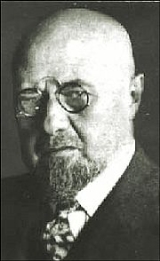
Aleksander Prystor
Encyclopedia
Aleksander Błażej Prystor (alɛˈksandɛr ˈprɨstɔr; 1874–1941) was a Polish
politician, soldier and activist who served as Prime Minister of Poland from 1931 to 1933.
He was a member of the Combat Organization of the Polish Socialist Party
and in 1908 took part in the Bezdany raid
.
Between 1912 and 1917 he spent in Russian prisons before being released in 1917. In march 1917 he joined Polish Military Organisation
. After independce he became secretary in the Ministry of Labour and Social Welfare. He fought as a volunteer in the Polish-Soviet War
of 1919-1920. He worked for few ministries (Labour, Industry and Commerce)
Between 1931 and 1933 he served as Prime Minister of Poland. After that he became the Marshal of the Polish Senate
1935-1938.
After the Soviet invasion of Poland
in 1939, he fled to neutral Lithuania
. After Lithuania was annexed by the USSR he was arrested in June 1940 by the NKVD
; he died in 1941 (the date is not known) in the prison hospital of the Butyrka prison
in Moscow.
Poland
Poland , officially the Republic of Poland , is a country in Central Europe bordered by Germany to the west; the Czech Republic and Slovakia to the south; Ukraine, Belarus and Lithuania to the east; and the Baltic Sea and Kaliningrad Oblast, a Russian exclave, to the north...
politician, soldier and activist who served as Prime Minister of Poland from 1931 to 1933.
He was a member of the Combat Organization of the Polish Socialist Party
Combat Organization of the Polish Socialist Party
The Combat Organization of the Polish Socialist Party , also translated as Fighting Organization of the Polish Socialist Party; also known as bojówki ; Organizacja Spiskowo-Bojowa PPS ; Koła Bojowe Samoobrony Robotniczej and Koła Techniczno-Bojowe The Combat Organization of the Polish Socialist...
and in 1908 took part in the Bezdany raid
Bezdany raid
Bezdany raid was a train robbery carried out on the night of 26/27 September 1908 in the vicinity of Bezdany near Vilna on a Russian Empire passenger and mail train by a group of Polish revolutionaries, led by future Polish national hero and dictator, Józef Piłsudski.- Background :Piłsudski...
.
Between 1912 and 1917 he spent in Russian prisons before being released in 1917. In march 1917 he joined Polish Military Organisation
Polish Military Organisation
Polish Military Organisation, PMO was a secret military organization created by Józef Piłsudski in August 1914, and officially named in November 1914, during World War I. Its tasks were to gather intelligence and sabotage the enemies of the Polish people...
. After independce he became secretary in the Ministry of Labour and Social Welfare. He fought as a volunteer in the Polish-Soviet War
Polish-Soviet War
The Polish–Soviet War was an armed conflict between Soviet Russia and Soviet Ukraine and the Second Polish Republic and the Ukrainian People's Republic—four states in post–World War I Europe...
of 1919-1920. He worked for few ministries (Labour, Industry and Commerce)
Between 1931 and 1933 he served as Prime Minister of Poland. After that he became the Marshal of the Polish Senate
Senate of Poland
The Senate is the upper house of the Polish parliament, the lower house being the 'Sejm'. The history of the Polish Senate is rich in tradition and stretches back over 500 years, it was one of the first constituent bodies of a bicameral parliament in Europe and existed without hiatus until the...
1935-1938.
After the Soviet invasion of Poland
Soviet invasion of Poland
Soviet invasion of Poland can refer to:* the second phase of the Polish-Soviet War of 1920 when Soviet armies marched on Warsaw, Poland* Soviet invasion of Poland of 1939 when Soviet Union allied with Nazi Germany attacked Second Polish Republic...
in 1939, he fled to neutral Lithuania
Lithuania
Lithuania , officially the Republic of Lithuania is a country in Northern Europe, the biggest of the three Baltic states. It is situated along the southeastern shore of the Baltic Sea, whereby to the west lie Sweden and Denmark...
. After Lithuania was annexed by the USSR he was arrested in June 1940 by the NKVD
NKVD
The People's Commissariat for Internal Affairs was the public and secret police organization of the Soviet Union that directly executed the rule of power of the Soviets, including political repression, during the era of Joseph Stalin....
; he died in 1941 (the date is not known) in the prison hospital of the Butyrka prison
Butyrka prison
Butyrka prison was the central transit prison in pre-Revolutionary Russia, located in Moscow.The first references to Butyrka prison may be traced back to the 17th century. The present prison building was erected in 1879 near the Butyrsk gate on the site of a prison-fortress which had been built...
in Moscow.
Honours and awards
- Silver Cross of the Virtuti MilitariVirtuti MilitariThe Order Wojenny Virtuti Militari is Poland's highest military decoration for heroism and courage in the face of the enemy at war...
- Grand Cross of the Order of Polonia Restituta, previously awarded the Commander's Cross
- Cross of IndependenceCross of IndependenceCross of Independence was one of the highest Polish military decorations between World Wars I and II. It was awarded to individuals who had "fought heroically for the independence of Poland," and was released in three versions.- History :...
with Swords - Cross of Valour
- Grand Cross of the Order of ChristOrder of Christ (Portugal)The Military Order of Christ previously the Royal Order of the Knights of Our Lord Jesus Christ was the heritage of the Knights Templar in Portugal, after the suppression of the Templars in 1312...
(Portugal, 1931)

